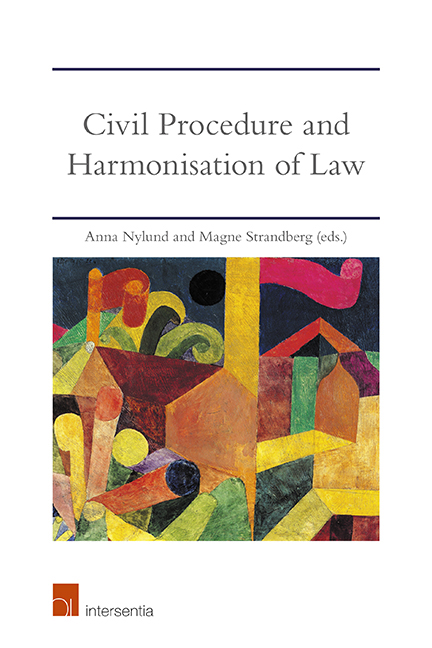Book contents
- Frontmatter
- Preface
- Contents
- List of Contributors
- List of Abbreviations
- Introduction
- EU Civil Justice at the Harmonisation Crossroads?
- The ELI-UNIDROIT Project: An Introduction and an English Perspective
- Europeanisation of Civil Procedure: Overcoming Follow-Up Fragmentation through Bottom-Up Harmonisation?
- Harmonisation or Fragmentation of National Law? An East Nordic Perspective
- An Examination of the Influence of European Union Law on English Civil Procedure
- The EU's Influence on Norwegian Civil Procedure through National Substantive Law
- Consumer Protection and EU-Driven Judicial Activism in the Netherlands
- The Role of the Judge in Consumer Cases – A German Perspective
- Ex Officio Application of the Unfair Terms Directive Cases against Consumers: A Swedish Perspective
- Ex Officio Application of EU Consumer Protection Law in Norwegian Courts
- Maintenance and Multi-Level Harmonisation: A European Union Perspective
- Family Maintenance and Multi-Speed Integration: A Norwegian Perspective
- Conclusions on Civil Procedure and Harmonisation of Law
- About the Editors
Ex Officio Application of EU Consumer Protection Law in Norwegian Courts
Published online by Cambridge University Press: 30 March 2019
- Frontmatter
- Preface
- Contents
- List of Contributors
- List of Abbreviations
- Introduction
- EU Civil Justice at the Harmonisation Crossroads?
- The ELI-UNIDROIT Project: An Introduction and an English Perspective
- Europeanisation of Civil Procedure: Overcoming Follow-Up Fragmentation through Bottom-Up Harmonisation?
- Harmonisation or Fragmentation of National Law? An East Nordic Perspective
- An Examination of the Influence of European Union Law on English Civil Procedure
- The EU's Influence on Norwegian Civil Procedure through National Substantive Law
- Consumer Protection and EU-Driven Judicial Activism in the Netherlands
- The Role of the Judge in Consumer Cases – A German Perspective
- Ex Officio Application of the Unfair Terms Directive Cases against Consumers: A Swedish Perspective
- Ex Officio Application of EU Consumer Protection Law in Norwegian Courts
- Maintenance and Multi-Level Harmonisation: A European Union Perspective
- Family Maintenance and Multi-Speed Integration: A Norwegian Perspective
- Conclusions on Civil Procedure and Harmonisation of Law
- About the Editors
Summary
INTRODUCTION: THE STATUS OF EU CONSUMER PROTECTION LAW IN NORWAY
On numerous occasions the Court of Justice of the European Union (ECJ) has concluded that national courts of European Union Member States have an obligation to protect EU consumer rights of their own motion (so-called ex officio). The starting point was Directive 93/13/EEC on unfair terms in consumer contracts, but over the years this obligation has been extended to other parts of EU consumer protection law, such as Directive 1999/44/EC on consumer sale contracts, and Directives 87/102/EEC and now 2008/48/EC on consumer credit contracts. The ECJ has justified these inroads into national procedural law primarily by the need to compensate for the imbalance that generally exists between the consumer and the seller or supplier.
Through the Agreement on the European Economic Area (EEA Agreement), EU consumer protection law is also applicable in Norway. On the basis of Article 72 of the Main Part of the EEA Agreement, the EEA Joint Committee has incorporated the entire body of EU consumer contract law into the Agreement's Annex XIX. Among the EU legal acts found in this Annex are the abovementioned Directives on unfair terms in consumer contracts, consumer sale contracts and consumer credit contracts.
The object and purpose of the EEA Agreement is to extend the EU internal market to the participating EFTA States (Iceland, Liechtenstein and Norway). The only way to achieve this is through uniform interpretation and application of the common rules of EU and EEA law. Based on this ‘principle of homogeneity‘, it may be safely assumed that the ECJ's deduction of procedural obligations from the consumer contract directives is also applicable in an EEA law context.
The EFTA Court confirmed this is in Engilbertsson. Paraphrasing ECJ case law, the EFTA Court noted that:
Given the nature and significance of the public interest which constitutes the basis of the protection guaranteed to consumers, who are in a weak position vis- a -vis sellers or suppliers, Directive 93/13/EEC requires EEA States to provide for adequate and effective means to prevent the continued use of unfair terms in contracts concluded with consumers by sellers or suppliers.
- Type
- Chapter
- Information
- Civil Procedure and Harmonisation of LawThe Dynamics of EU and International Treaties, pp. 171 - 192Publisher: IntersentiaPrint publication year: 2019
- 3
- Cited by



